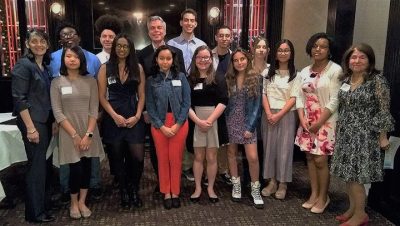Essay Contest Inspires Local High School Students
News Based on facts, either observed and verified directly by the reporter, or reported and verified from knowledgeable sources.

You’re reading a sample from the Examiner+ newsletter, available in full for subscribers.
Join our partial access option for free here: Examiner News
Lifting Up Westchester, a non-profit agency committed to helping individuals experiencing homelessness and hunger achieve self-sufficiency, is conducting its sixth-annual high school student essay contest.
Open to all students attending school in Westchester in the 7th to 12th grades, this year, students are invited to think about the connections between, and misperceptions about, mental health and homelessness and how we might end the stigmas attached to both. Entries are accepted now through February 17, 2023.
The essay contest was established in 2017 in memory of Beth Massey Rubens, a lifelong teacher, tutor, and mentor who had a love for language arts.
We spoke with Rubens’ sister, White Plains resident Hannah Nelson, Lifting Up Westchester CEO Anahaita Kotval, and Ellen LaNicca, LUW’s volunteer essay contest director.
Hannah, tell us about your sister, Beth.
Hannah Nelson: I grew up alongside my older sister Beth, a younger brother Sidney, and a younger sister Ellen. We lived in a two-family home with my aunt and uncle’s family. Our family dinner conversations were lively, often triggered by news events and articles my father posted on a little bulletin board in the kitchen. We were encouraged (pre-electronic era) to go to the Encyclopedia Britannica for answers to many of our questions, and if we didn’t, we might be labeled “intellectually lazy.” Needless to say, we didn’t want this to happen. I idolized my sister Beth. She was gorgeous — yet modest and lacking all vanity — popular, had beautiful penmanship, and, importantly, was so smart. She could speak with my father about literature, language, and theatre when I couldn’t.
She died ten years ago from non-small cell lung cancer of an unknown cause. Starting at age 20, Beth taught English in vocational, public, and private high schools. In her first year as a teacher, Beth was just two years older than many of her students. Beth was an avid reader and theater-goer, and with her husband, Jeff, she co-authored books about words that included acrostic and double-crostic puzzles.
I moved to Westchester from New York City a few years after she did. We saw each other at least weekly and spoke daily. She was my biggest fan and harshest critic. She was an amazing mother and aunt, knowing intuitively what each child needed, even telling me on one occasion to put my principles aside and buy my daughter designer jeans — and of course, she was right. All the attributes that I loved about my sister when she was young only became more pronounced as time passed. She was always my “bellwether.”
Subsequently, how did the idea for the essay contest come about?
Hannah Nelson: The idea of doing something so as to preserve someone’s memory is a family custom. My father created a journal he called “The Family Chronicle,” which documented our family history. My sister Beth and I created a scholarship in our parents’ memory at The City College of New York.
When I joined the Board of LUW, I realized that although I had lived in Westchester for over 35 years, I had never heard of the organization. As a resident of and employee in New York City, I was familiar with homelessness. However, I didn’t see poverty in Westchester. I didn’t see people sleeping on the streets. My early days as a board member, then, were educational. As I became more familiar with the magnitude of social issues in Westchester, and as I continued to quietly mourn my sister, I had the realization that I could do something in her memory that would help promote knowledge of LUW and build a donor base.
I came up with the idea of an essay contest as a way of pairing two goals — namely, getting kids to think about complex social issues by reading and writing about them and directing them to LUW for information on our programs.
Anahaita, can you recall when Hannah reached out to you with the idea for the contest?
Anahaita Kotval: Yes, it was in the summer of 2017 at a meeting of our fundraising committee. We were talking about how little anyone in Westchester knew about Lifting Up Westchester, and Hannah suggested an essay contest might be a good way to raise awareness among both young people and their parents. When we were unable to get a corporate sponsor, Hannah agreed to sponsor the contest in memory of her sister — who was an educator and passionate about writing.
Why did you embrace the idea for the contest?
Anahaita Kotval: While our primary mission is to provide direct services, educating the community about people experiencing homelessness is also important. Without community understanding and support, organizations like ours cannot succeed, and without community understanding and support, our clients cannot succeed. (Employers, landlords, and others need to be willing to give them a chance to get their lives back.)
In your mind, what are the goals/objectives for the contest in terms of benefiting LUW?
Anahaita Kotval: Pushing young people to think more deeply about issues related to extreme poverty and homelessness — not just surface assumptions or emotions — but to think analytically, look at the facts, and then develop a reasoned view of the issue. And once understanding an issue being able to think about possible solutions. And, of course, continuing to develop writing as a tool for effective communication and advocacy.
Ellen, can you describe the contest’s entry selection process?
Ellen LaNicca: The essay contest is open to any student in grades 7 through 12 who goes to school in Westchester. We established three grade categories: 7th and 8th, 9th and 10th, and 11th and 12th to level the playing field. We also established a dedicated ESL category when we started receiving a large number of essays from students going to school in Westchester, but for whom English was their second language.
Our volunteer judges are an extraordinary group of men and women. They come from many backgrounds. This year, because our topic explores the issue of mental health, we are adding judges whose expertise is in that area.
Each student’s essay is read and scored by a judging group that comprises ten individuals who come from a mix of these backgrounds. The scores from the judging group are averaged, and students whose average reaches 90 points or higher are considered for the top prizes.
I read the essays each year, and I can tell you that the judges often have a difficult task selecting the winners. So many students eloquently express their thoughts; they make it very personal and often suggest ideas no one else has thought of. I am in awe of this next generation; I do believe we will be in very good hands.
Can you characterize the responses you’ve received about the contest from parents and teachers?
Ellen LaNicca: Over the years, essays have explored many topics, such as the Importance of Second Chances, Why Hope is Important, and Lessons Learned From the Pandemic. Throughout the years, parents have thanked me for giving their children a forum to share personal experiences and consider life through someone else’s prism. Parents have commented that this Essay Contest has encouraged their children to write, without judgment, on important social issues. When you give young adults an opportunity to share their voices on how to make life better, you will be impressed and humbled by what they write.
Last year teachers shared comments about the students’ essays, as well. Rosemary Beirne, the principal of The Ursuline School, congratulated Isabella Vembenil, who won second place in the 9th and 10th-grade category, with these words: “What I loved most about Isabella’s essay was the notion of home. Channeling Dorothy from The Wizard of Oz, she stated simply: ‘There’s no place like home. I agree. And there’s no place that can replace home when it is lost. That is why it is so important to raise awareness of the need for housing, for everyone to have a place to call home.’”
Eligible students can submit their entries through Lifting Up Westchester’s online essay contest portal.

